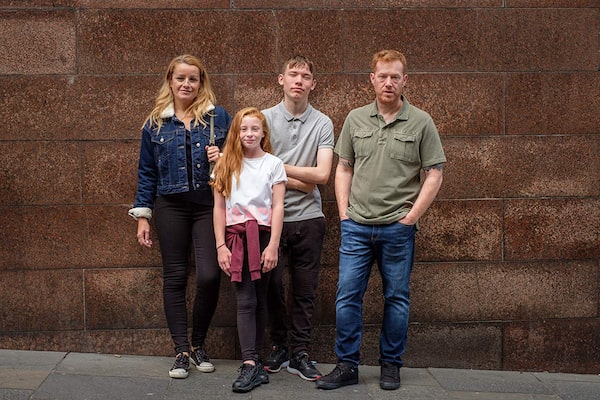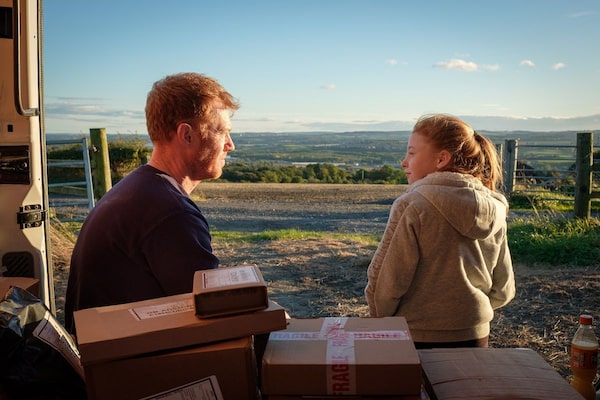
From left: Debbie Honeywood, Katie Proctor, Rhys Stone and Kris Hitchen from Ken Loach's Sorry We Missed You.Sixteen Films
- Sorry We Missed You
- Directed by Ken Loach
- Written by Paul Laverty
- Starring Kris Hitchen, Debbie Honeywood and Rhys Stone
- Classification 14A; 101 minutes
Nothing appeals to people more than wanting to be their own boss. I know this, because as a freelance writer (I don’t have a full-time job in my field, and likely never will), it’s the No. 1 comment that I get when explaining my daily life. Only, the reality of self-employment is far from how it’s dreamed when it’s not out of choice, but desperation.
Sorry We Missed You examines the world of predatory zero-hour contracts, and how the new normal of precarious employment through the gig economy can destroy an otherwise solid family. Frequent collaborators screenwriter Paul Laverty and director Ken Loach follow up their 2016 Palme d’Or winner I, Daniel Blake with a story that is so of the moment, it will be looked back on as the first of its kind to tackle the dangers of how the gig economy preys upon society’s most vulnerable.
Sorry We Missed You follows the Murphy family as they try to rebuild their life in Britain following the 2008 recession. Patriarch Ricky finds the opportunity to become a self-employed delivery driver – which is when everything goes downhill. His wife, Abbie, a home-care nurse, sells their family car to afford Ricky’s van rental. With the promise that this is all necessary for Ricky to rake in cash and dig the family out of debt, it’s a sacrifice that Abbie is willing to make – even if it means taking buses across town, which will mean longer days.

Sorry We Missed You follows the Murphy family as they try to rebuild their life in Britain following the 2008 recession.Sixteen Films
Both parents working as hard as they can, their children, a teen son Seb and tween daughter Liza Jane, fall to the wayside. Seb pushes his parents through rebelling the way many teens do, but without parental supervision the problems and consequences become more severe than they should. We see both Ricky and Abbie work until they can barely stay awake, or see each other, to make ends meet and the toll it takes on their otherwise loving marriage. Both their jobs become increasingly taxing, and the family runs into problems they’ve never encountered and are not equipped to deal with.
Sorry We Missed You is not an easy movie to sit through. Much like its predecessor I, Daniel Blake, the entire film is deeply affecting – I watched most of it through tears. We see this family sink further into despair and fall apart, not because of a lack of love, understanding or communication – but because of a system that disenfranchises the poor and destroys their lives. Because this film is so rooted in real experiences of delivery drivers and gig workers (and because it’s made by Loach) you know to not expect much joy at all. But because the director weaves in enough scenes to show how deeply this family cares for one another, it never feels voyeuristic in its sadness but true to reality. This isn’t about emotional manipulation or poverty porn, it’s about showing a family as a whole.
Loach, now 83, has been making political films since 1967. It would be easy to assume he might lose his touch over the course of 50 years, or not understand the everyday life of the working class, but Sorry We Missed You almost feels too real. If you’ve shopped online and have opted for same-day delivery or if you’ve used a ride-sharing app, it’s almost impossible to watch the film and not feel a veil lifting, even though the evil of these companies is no secret. The viewer has little choice but to reckon with how they participate in a system that only works for the customer through the exploitation of someone else.
Sorry We Missed You is enough to radicalize anyone into questioning and understanding the toll the gig economy takes – and how the myth of bootstrapping traps so many into thinking that working as hard as you can is enough to overcome the worst of capitalism.
Sorry We Missed You opens March 6
Plan your screen time with the weekly What to Watch newsletter, with film, TV and streaming reviews and more. Sign up today.